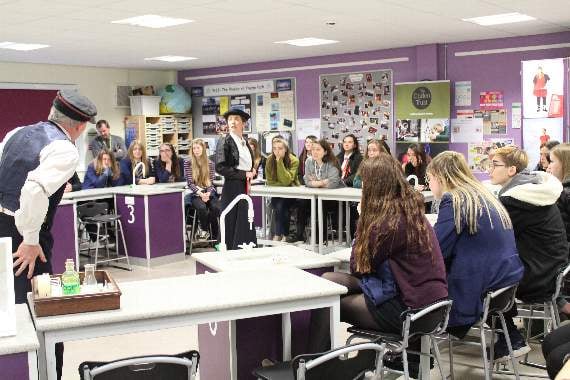The national Girls Into Physics movement has come to the schools in the South Hams, encouraging more female students to pursue the sciences.
Across the country there is a gender disparity across all STEM(Science, Technology, Engineering and Maths) subjects in all educational levels. Schools in South Devon have been trying to improve the currently low number of female students who study the sciences.
At Kingsbridge Community College last week, female students had a unique opportunity to experience a Girls into Physics Day, focussed around the triumphs of Lise Meitner, who along with her male colleague Otto Hahn, made a significant scientific discovery in atomic physics and nuclear fission.
This day was organised to try and encourage more students to pursue physics and eradicate the stigma which can sometimes discourage women from partaking in the sciences.
Head of Science, Mr Phil Atherton said the stigma surrounding the sciences can be seen starting from primary school and even the early play groups.
“It is evident in our culture” that girls are not always actively encouraged to pursue the sciences because it is often seen as a “boys” subject, explained Mr Atherton.
He said it can sometimes originate from how we are brought up which can lead to more girls going towards the arts. Previously working as a teacher in Malaysia, Mr Atherton explained that this stigma did not exist there and he was shocked to find it was so evident when he got the job at Kingsbridge Community College.
However, he was delighted to announce that after starting a few years ago with no girls in his A-level physics class, now there were 14 girls studying the subject and last year, two girls went onto study it at university.
Yet, there is still room for improvement to reach gender equality in STEM subjects.
The Girls into Physics day which took place on Friday, February 23, involved KCC, KEVICC, St Cuthbert Mayne in Torquay and Brixham College. Students from year 10, 11 and 12 attended the event, called ‘Meitner Day’, organised by KCC, The Ogden Trust and the creative learning company, Links to a Life.
The Ogden Trust was founded in 1999 with the aim to promote the teaching and learning of physics.
The ‘Meitner Day’ was a day long experience designed to be run in schools where the spotlight was on one of science’s unsung feminine heroes-the ground breaking Austrian atomic physicist Lise Meitner whose work changed the world.
The day was run to encourage more young women to consider studying physics at A-level and beyond, consisting of five hour-long sessions.
At midday, actors from Links to a Life staged a play ‘The Lise Meitner Story’ depicting her life before, during and after the Second World War.
Lise Meitner was Austrian, but after obtaining her doctorate she moved to Berlin to study and consequently work alongside Otto Hahn. Together they made an important scientific discovery at the cutting edge of atomic physics and nuclear fission which was honoured with a Nobel Prize in 1944.
However, it was exclusively awarded to Hahn, which is now considered a great injustice.
While Meitner and Hahn were working together, the Nazi party took control of Germany and thusly invaded her homeland of Austria. The party discovered that Meitner’s grandparents were Jewish which placed her in great danger so she escaped to Sweden where she lived as a refugee, continuing to correspond with Hahn about their work.
While there, Meitner was approached by other scientists and offered the chance to work in America with them to create an atomic bomb. However, she refused and said she wanted no part in it.
After the war, Meitner toured the world tying to encourage more girls to get into the sciences.
In 2017, data from the Institute of Physics shows the percentage of girls taking A-level physics was 21.5 per cent and since the early 1990s the proportion of girls has not risen above 23.1 per cent.
In the other sciences, girls are more equally represented. In 2017, 50.9 per cent of the entrants for A-level chemistry were girls and for biology, 61.7 per cent of the A-level students were female.
Principal, Kenny Duncan said the local schools involved were part of a lucky few across the country to have this opportunity and he hoped it would encourage more female students to get involved in the STEM subjects.





Comments
This article has no comments yet. Be the first to leave a comment.